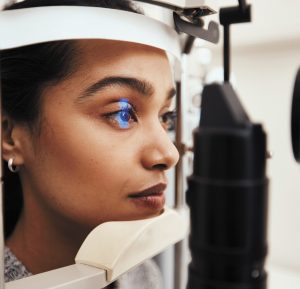 January is Glaucoma Awareness Month, focusing attention on a stealthy set of eye diseases that damage the optic nerve, a central part of clear vision. In most glaucoma cases, excessive pressure within the eye degrades crucial nerve fibers, distorting vision and leading to total blindness in serious cases.
January is Glaucoma Awareness Month, focusing attention on a stealthy set of eye diseases that damage the optic nerve, a central part of clear vision. In most glaucoma cases, excessive pressure within the eye degrades crucial nerve fibers, distorting vision and leading to total blindness in serious cases.
“Glaucoma is particularly dangerous to vision because in the beginning, it is usually symptomless,” says Board-certified Comprehensive
Ophthalmologist and Fellow of the American Academy of Ophthalmology, Dr. Jose Alfredo Vazquez. “A person may not notice immediate changes to their vision even as glaucoma is causing irreparable damage. Discovering glaucoma before it can compromise eye health and function allows effective management to begin right away, which will work to slow or even stop permanent vision loss. That’s why regular comprehensive vision tests should be part of everyone’s overall healthcare plan.”
Most cases of glaucoma involve poor drainage of corneal fluid from the eye. Primary open-angle glaucoma comprises about 80% of cases, and becomes more common as people get older. Less common is closed-angle glaucoma, in which the eye’s drainage angle becomes blocked or closed entirely. This type can progress gradually or occur suddenly, requiring immediate emergency medical attention. Rarer types include secondary glaucoma and normal-tension glaucoma.
While glaucoma can affect nearly anyone, most cases occur after age 40. “That’s why we like to see all people have a routine comprehensive eye exam by age 40 at the latest,” says Dr. Vasquez. “Having an initial exam in one’s twenties lets us establish a record of a person’s physical and family history, and catch anything unusual that may be present. From there, your eye doctor will recommend a schedule for regular dilated pupil exams based on particulars such as your personal and family history, as well as background and lifestyle.”
At age 40, everyone should have regular eye exams every 2-4 years. At 65 and older, it’s important to schedule exams every 1-2 years to catch glaucoma, age-related macular degeneration, cataracts and other sneaky disorders before they have a chance to damage vision. Happily, nearly all eye diseases can be treated with great success. Glaucoma, for example, is typically well-managed with eye drops and/or oral medication. The earlier eye problems are diagnosed, the easier they are to treat. With regular exams, not only can healthy vision be preserved, it may even be able to be restored.
If it’s been a while since your last comprehensive eye exam, contact your local Lake Eye. We’re here to keep your eyes healthy, comfortable and seeing clearly.
Lake Eye
352-775-1533
LakeEye.com
 Central Florida Health and Wellness Magazine Health and Wellness Articles of the Villages
Central Florida Health and Wellness Magazine Health and Wellness Articles of the Villages



